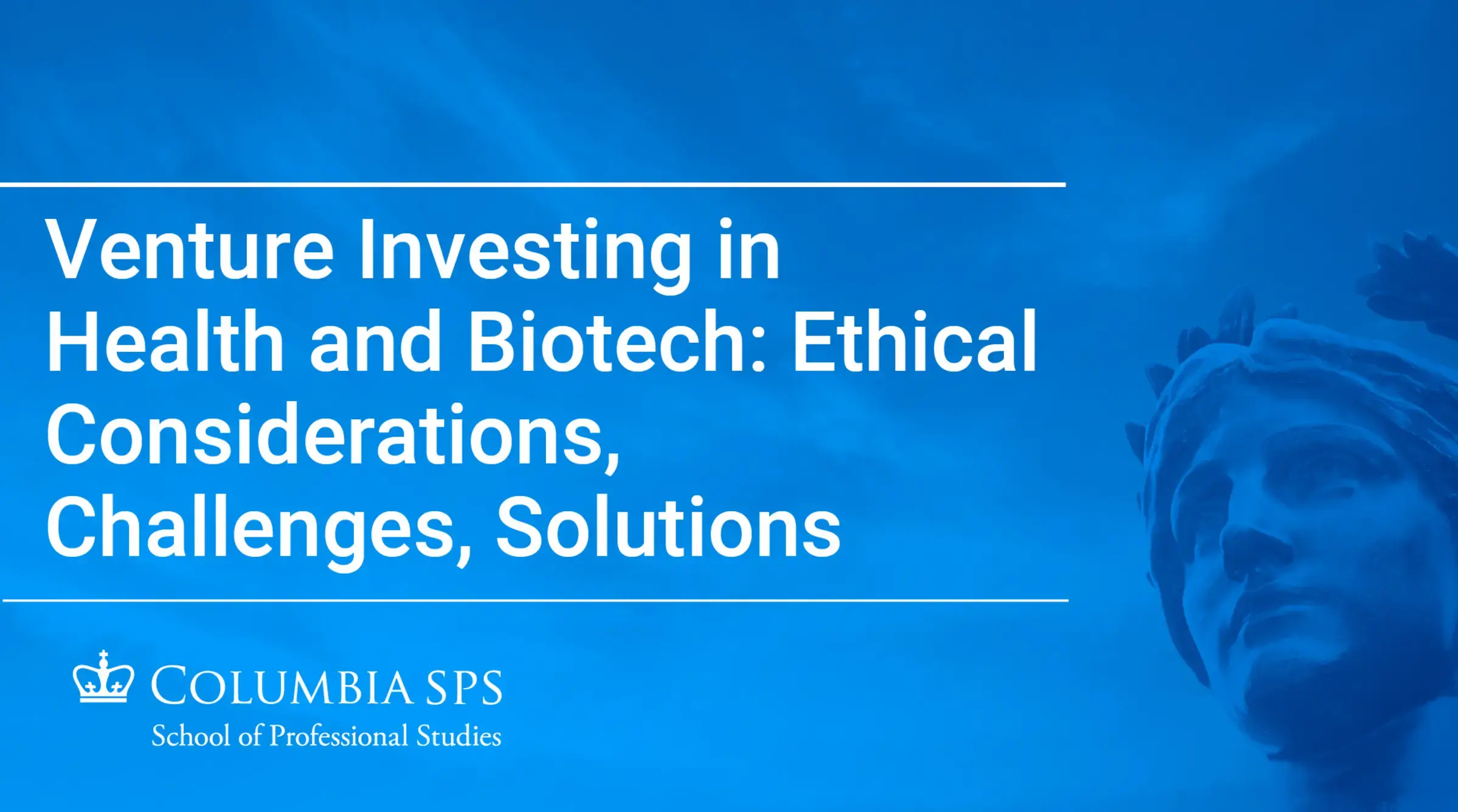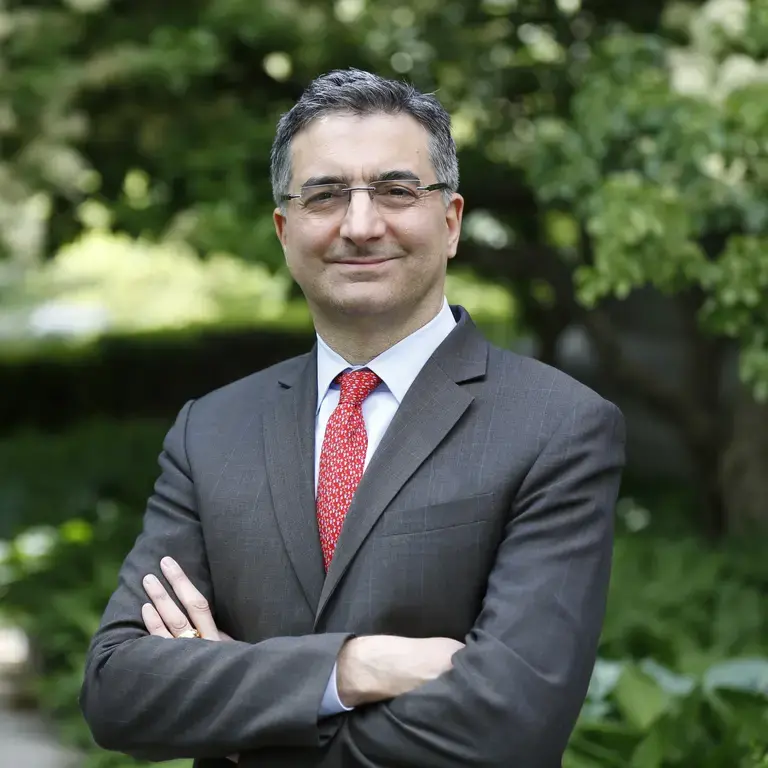Venture Investing in Health and Biotech: Ethical Considerations, Challenges, Solutions
Life science investors and start-ups they support have helped launch many important advances in medicine, health care, and biotech. They play a vital role in addressing unmet medical needs, through the development of novel treatments and solutions. But ethical questions and challenges also arise. Occasionally, “scandals” have emerged - surrounding the marketing of prescription opioids; misleading and false claims of a technology as in the case of Theranos; inappropriate disclosure of inter-corporate relationships and insurance manipulation as in the case of Valeant; and conflicts of interest concerning the sale of patient info as happened at Sloan Kettering. At Yale University and elsewhere, student groups have criticized institutional investments in various companies, seeking greater accountability that portfolio companies meet higher ethical standards as a pre-qualifying condition for investing in them. Policy makers have also stated broadly that they want to address the increasing costs of medications.
PROGRAM DESCRIPTION
This panel discussion features a diverse group of experts, all accomplished leaders in their respective fields. We will engage the panelists in a didactic exchange, and invite attendees to participate so that we can together examine key ethical issues pertaining to healthcare and biotech investing. The program offers a rare and unique opportunity to gather insights from esteemed Silicon Valley investors and biotech pioneers and others and to develop new vantage points through which ethical issues in life science investing can be viewed and considered.
Topics and questions include:
- Should Venture Capital companies and start-ups consider ethical issues and take these into account when investing, and if so, how and to what degree?
- How does the fiduciary responsibility to deliver ‘return on investment’ fit with ethical issues?
- What types of models exist, or could emerge to help instill higher ethical standards for health investing? (e.g, perhaps an ‘ethical scorecard’ in quarterly reports).
- How should VC firms and start-ups address these issues?
- Should we engage large corporations in the debate, and can we compel them to be part of the solution?
- What ‘next steps’ might be taken to bring about the most desirable outcomes?
MODERATOR
Robert Klitzman, M.D., Director, Master of Bioethics, Columbia University
PANELISTS
Douglas Crawford, Ph.D., Managing Director, Mission Bay Capital; General Manager, MBC BioLabs
Douglas Crawford’s mission is to help entrepreneurial scientists to create successful startups by removing barriers between great ideas and successful companies. Crawford is the founder of MBC BioLabs in San Francisco and San Carlos, an incubator program and state-of-the-art co-working space for entrepreneurs seeking to rapidly generate data without getting bogged down in facility management. Entrepreneurs at MBC BioLabs have gone on to launch 127 companies that have raised over $3B.
Crawford is also the Managing Director of Mission Bay Capital, where he has overseen investments in companies such as Alector, Calithera, iPierian, Principia, Redwood Biosciences, True North, Zephyrus, and Cell Design Labs. He is a board member of Alessa, Avexegen, Epiodyne, Graphwear, Invenio, Magnamosis, Magnap, SiteOne (observer), and Tangible Sciences.
Crawford received a Ph.D. in Biochemistry from the University of California, San Francisco.
Robert Kilpatrick, Ph.D., Founder, President, CEO, Health Innovation for People, Inc.
From 1992 to 2013, Robert Lee Kilpatrick was a founding Partner at Technology Vision Group LLC, which connected innovators and leaders in the life science industry to form successful partnerships. Robert played an instrumental role in the development of the first BioPartnering events held around the world and the first online networking product for the life science industry—biopartnering.com—which created business development opportunities in more than forty countries.
Kilpatrick has written numerous publications about life science and health care. His forthcoming book, “Health: The Whole Story,” will examine the economic, political, and social factors that contribute to healthy societies, offering a blueprint for building a more effective, inclusive health care system.
Kilpatrick received a Ph.D. in the History of Medicine from the University of Cambridge.
Barry Selick, Ph.D. Vice Chancellor, Innovation & Partnerships, UCSF
Barry Selick is the Vice Chancellor of Business Development, Innovation and Partnerships at UCSF’s Innovation Ventures. Before joining UCSF, he served as the CEO of Threshold Pharmaceuticals, a fully integrated oncology drug discovery/clinical development company. Prior to Threshold, Barry co-founded and served as the CEO and Chairman of Camitro, a venture capital-backed drug discovery technology company based in California and Cambridge, United Kingdom. Selick has also served as the Vice President of Research at the Affymax Research Institute, and as a bench scientist at PDL BioPharma, where he co-invented the first FDA-approved, fully humanized antibody therapeutic which went on to be licensed to and sold by Roche for the prevention of kidney transplant rejection.
Selick has sat on and/or chaired a number of private and public biotech company boards, including Molecular Templates, Protagonist Therapeutics, and PDL Biopharma.
Selick received a B.S. in Biophysics and Ph.D. in Biology from the University of Pennsylvania. He was a Damon Runyan-Walter Winchell Cancer Fund Fellow as well as a Senior Fellow of the American Cancer Society at UCSF.

